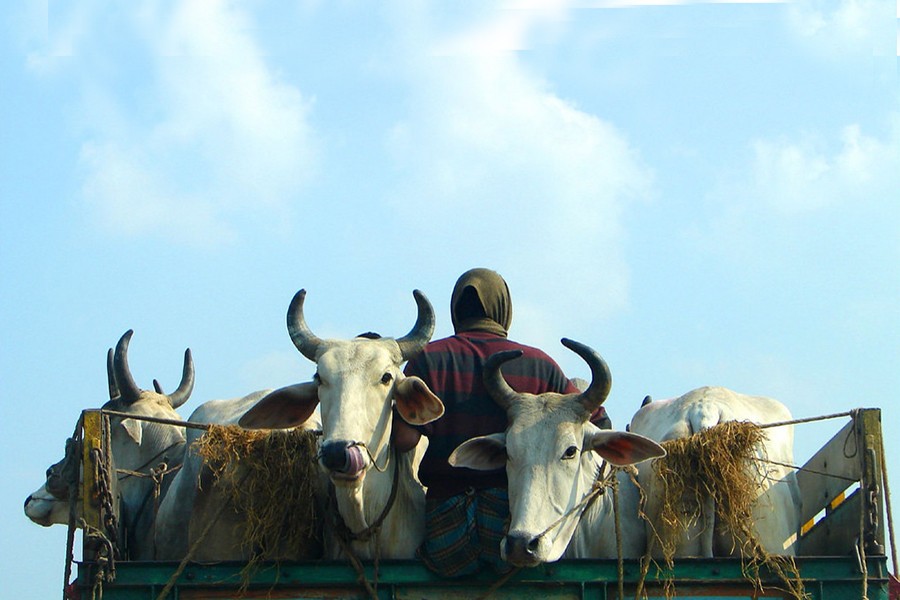
Published :
Updated :

Local cattle farmers are in fear of incurring a heavy loss in this Eid-ul-Azha mainly due to influx of smuggled cows from India.
Thousands of animals have been smuggled into the country during the last few months. As a result, the local cattle market is now flooded with Indian cows, insiders said.
Imported animals have flooded bordering districts, including Kurigram, Lalmonirhat, Nilphamari, Jhenaidah, Chuadanga and Kushtia, along with many other districts in the country.
It has put hundreds of local farmers and investors, related with cow rearing and fattening, in a peril, they added.
According to the National Board of Revenue (NBR), cattle import from India dropped to just 0.9 million in the financial year (FY) 2016-17 from 2.1 million in FY 14.
The NBR data also shows that the import of cattle has been declining during the last five years. The Indian government's restriction on cow export has reduced the supply from the neighbouring country.
"The declining import helped to raise the demand for local cattle, encouraging hundreds of investors to rear cattle in the country," said Ashraful Islam Swapan, a cattle farmer and trader in Nilphamari.
He said disbursement of loan at only five per cent interest rate under Bangladesh Bank's refinancing scheme also encouraged large-scale cattle farming across the country.
"We got optimum prices for our cattle during the last two years. But we are going to incur a huge loss this year."
He also said cattle prices have dropped minimum 40 per cent during the last three months in Nilphamari following the influx of Indian cows.
Indian cattle are being smuggled into the district through Dimla and Jaldhaka bordering areas.
"I have 40 bulls to sell ahead of the sacrificial festival."
He further said the total cost for rearing an animal, weighing 120-125 kg, is minimum Tk 40,000. But each Indian cow of the same size was sold at Tk 28,000-30,000 in Nilphamari cattle market on Wednesday.
Apart from the bordering districts, farmers of the adjacent districts of the capital, particularly in Narshingdi, Munshiganj, Manikganj and Narayanganji, have reared and fattened bulls in a large number to sell those in the Eid-ul-Azha.
According to the Department of Livestock Services (DLS), 0.25 million people are now directly involved in cow rearing, of whom above 0.1 million people came to the sector during the last three years.
Aslam Ali, owner of Aslam Farm House at Madhabdi in Narshingdi, told the FE that at present he has 95 bulls.
"I've invested Tk 5.6 million to rear cows during the last two and half years."
He also said prices of cow have dropped notably in his area.
"If the trend continues, I'm going to lose 30-40 per cent of my total investment."
He further said hundreds of farmers like him might be unable to repay their bank loans following the fall in cattle prices.
The government should take stern actions against cow smuggling, he opined.
DLS director general Dr Hiresh Ranjan Bhowmik said the supply of locally-reared cattle may rise to 5.0 million in the upcoming Eid-ul-Azha from 4.5 million last year.
He also said local home-reared cattle will be above 90 per cent of the total demand of sacrificial animals, estimated at maximum 5.5 million.
"There will be no crisis of cattle in this Eid," he added.
According to DLS, the total number of cattle in Bangladesh has also been increasing year-on-year basis.
The number rose to 26 million in FY 18 from 24.5 million in FY 17.
DLS estimated that nearly 10 million cattle are slaughtered in the country each year, of which almost 50 per cent are sacrificed during the Eid-ul-Azha festival.
tonmoy.wardad@gmail.com


 For all latest news, follow The Financial Express Google News channel.
For all latest news, follow The Financial Express Google News channel.